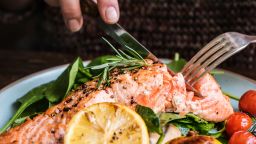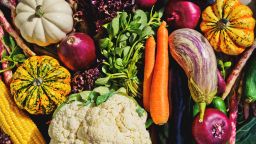
Sign up for CNN’s Eat, But Better: Mediterranean Style. Our eight-part guide shows you a delicious expert-backed eating lifestyle that will boost your health for life.
Eating a vegan, vegetarian or lacto-ovo vegetarian diet significantly reduces the overall risk of developing cancer, heart disease and dying early from cardiovascular disease, according to a new “umbrella” analysis of more than 20 years of research.
An umbrella review looks at existing metanalyses of large numbers of studies, providing a high-level view of existing research on a topic.

Middle eastern, arabic or mediterranean appetizers table concept with falafel, pita flatbread, bulgur and tomato salads, grilled vegetables, stuffed grape leaves,olives and nuts. los_angela/iStockphoto/Getty Images
In addition to lowering cardiovascular risk factors such as blood pressure and cholesterol, the umbrella analysis found a “protective effect” for specific cancers, including “liver, colon, pancreas, lung, prostate, bladder, melanoma, kidney and non-Hodgkin lymphoma,” said lead author Dr. Angelo Capodici, a graduate student in health science, technology and management at Scuola Superiore Sant’Anna in Pisa, Italy.
Vegetarians don’t eat any animal flesh, while the lacto-ovo version of vegetarianism allows dairy products and eggs while excluding all meat, poultry and fish. Veganism, the stricter form of vegetarianism, bans any food products made from meat, poultry and seafood as well as any animal by-products such as gelatin.
However, the protective nature of the diets could be sabotaged if poor dietary choices were made, the study authors said via email.
“Diets that emphasize consumption of unhealthy plant foods, such as fruit juices, refined grains, potato chips, and even sodas” might counter the positives of a plant-based diet for health, said study coauthor Dr. Federica Guaraldi, medical director of the pituitary unit at the IRCCS Institute of Neurological Sciences of Bologna in Italy.
Fruit juices, which are “full of sugars or sweetener,” Guaraldi said, “(were) recently demonstrated to have detrimental impact on metabolism as much as or even more than white sugar.”
Results may be affected by other lifestyle factors
Researchers have long known that people who follow plant-based diets often live healthier lives full of exercise and an avoidance of sugar-sweetened foods and beverages, refined grains, snacks, alcohol and tobacco, the study said.

An anonymous businesswoman sitting at the office, eating a protein bar while video calling with her colleagues FreshSplash/iStockphoto/Getty Images
“What is attributed to diet here may be in part due to other lifestyle practices,” said Dr. David Katz, a specialist in preventive and lifestyle medicine who founded the nonprofit True Health Initiative, a global coalition of experts dedicated to evidence-based lifestyle medicine. He was not involved in the study.
“That is a minor concern, however,” Katz said in an email. “The net effect of plant-predominant dietary patterns is clearly favorable to crucial health outcomes even if some of the observed benefit is attributable to other lifestyle practices.”
In fact, adopting a plant-based diet, even without additional exercise, could still yield health benefits, according to a November study on twins by Christopher Gardner, one of the coauthors of the umbrella analysis published Wednesday in the journal PLOS One.
In the 2023 study, healthy twins who ate a vegan diet for eight weeks had lower “bad” low-density lipoprotein, or LDL, cholesterol, better blood sugar levels and greater weight loss than siblings who ate a diet of meat and vegetables, according to Gardner, a research professor of medicine at the Stanford Prevention Research Center in Palo Alto, California.

Rawpixel/iStockphoto/Getty Images
“There was a 10% to 15% drop in LDL cholesterol, a 25% drop in insulin, and a 3% drop in body weight in just eight weeks, all by eating real food without animal products,” Gardner told CNN at the time.
One reason for that may be the nutritional boost that plants provide, including high levels of vitamins, minerals and other substances with antioxidant and anti-inflammatory effects, while also reducing the inflammatory impact of meat and processed food, the authors said.
“Plants have more fiber (animal foods have zero), less saturated fat and zero cholesterol (all animal foods have cholesterol),” Gardner said in an email. “An entirely separate category is phytochemicals (literally, ‘plant chemicals’) such as antioxidants. By definition there are no phytochemicals in animal foods.”
No meat, poultry or seafood, but dairy and eggs are OK
The new review analyzed 48 metanalyses that had investigated the impact of eating a vegetarian or vegan diet on the development of cancer, cardiovascular disease and early death.
“We analyzed reviews considering vegan and vegetarian diets that completely exclude(ed) meat, poultry and seafood,” said study coauthor Dr. Davide Gori, an associate professor of biomedical and neuromotor sciences at the University of Bologna in Italy.

Different vegetables in sunny day. Top view, close-up. Tatiana Maksimova/Moment RF/Getty Images
“To be more precise regarding vegetarian diets, lacto-vegetarian (allowing certain dairy products such as yogurt, cheese and milk), ovo-vegetarian (allowing whole eggs, egg whites and egg-containing foods such as mayonnaise, egg noodles and certain baked goods), (and) lacto-ovo-vegetarian diets were included,” Gori said in an email.
However, vegetarian diets limiting but not completely excluding certain types of meat and fish, such as pesco- or pollo-vegetarian diets, were excluded, he said.
The review found eating these plant-based diets reduced the risk of cardiovascular disease, diabetes and inflammation by affecting risk factors such as body mass index, fasting glucose and other measures of blood sugar control, and the systolic (top) and diastolic (bottom) measurements of blood pressure.

Shot of a vegan meal preparation with lots of vegetables and fruits on a domestic kitchen Wesley Soares Ferracini/Moment RF/Getty Images
The diets also significantly lowered total cholesterol, LDL cholesterol, and “C-reactive protein — an index of inflammation that is typically higher in cardiovascular and metabolic disease,” Gori said. Metabolic disease is a constellation of symptoms such as obesity, high blood pressure and poor control of cholesterol and blood sugars that can all lead to type 2 diabetes, heart disease and stroke.
However, there was no benefit in eating plants for pregnant women, an “intriguing finding” that needs further research, said Guaraldi of the IRCCS Institute of Neurological Sciences. It’s also possible that the hormones of pregnancy might affect findings, and “we cannot rule out that participants have taken supplements during the study period that could have altered the impact of diet on the considered parameters.”

Vegans abstain from all animal meat and by-products. Wesley Soares Ferracini/Moment RF/Getty Images
Special considerations of plant-based diets
Because certain vitamin and minerals are more easily found and absorbed from meat, dairy or fish, vegetarians and vegans must take extra precautions to add those into their diets, experts say.
Unless the diet is carefully optimized, additional sources of B12, calcium, iron, zinc, iodine and vitamin D may be needed to avoid a deficiency, according to the Mayo Clinic.

Woman with tasty pear salad on light background, closeup Liudmila Chernetska/iStockphoto/Getty Images
“Strictly vegan diets can be deficient in vitamin B12,” Gardner said. “This is easily resolved by consuming foods fortified with (vitamin) B12 — easy to do because the recommended daily allowance for B12 is lower than any other vitamin or mineral.
“Iron is another nutrient that is harder to get from a fully vegan diet,” Gardner added. “Many plant foods are relatively high in iron (beans/legumes). Again, supplements can be helpful.”
Protein is also a challenge, but good sources in plants include legumes such as lentils, chickpeas and beans, nuts, seeds, whole grains and soy products such as edamame, tempeh and tofu.
Processed meat substitutes are options as well, experts say, but due to the processing can be packed with sodium, so read labels carefully.

